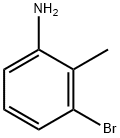ChemicalBook > Articles Catagory List >Organic-Synthesis-Intermediate >what-is-3-bromo-2-methylaniline-
What is 3-Bromo-2-methylaniline?
Feb 12,2020
3-Bromo-2-methylaniline is a 3-halo-2-methylaniline derivative. It is an important organic intermediate (building block) to synthetize substituted aniline products. 3-Bromo-2-methylaniline may be used in the preparation of 3,4-dibromo-2-methylaniline, racemic 3,9-dibromo-4,10-dimethyl-6H,12H,5,11-methanodibenzodiazocine, a racemic derivative of Tröger’s base, 4-bromo-1H-indazole, and so on.
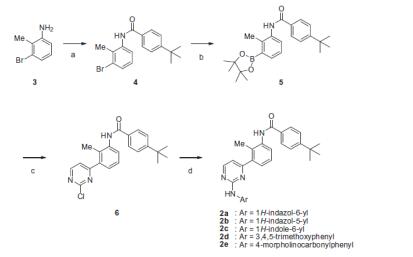

Kawahata et al. reported [1] its application on the synthesis of novel pyrimidine analogs, which are highly selective,non-covalent BTK inhibitors. BTK is a promising target for the treatment of multiple diseases such as B cell malignances, asthma, and rheumatoid arthritis. These compound demonstrated higher affinity to an unactivated conformation of BTK that resulted in an excellent kinase selectivity and showed a good oral bioavailability in mice, and significantly inhibits the PCA reaction in mice.
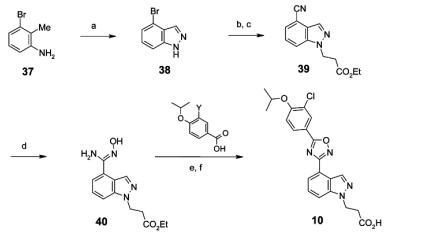

Skidmore et al. reported [2] its application on the synthesis of sphingosine-1-phosphate‑1 receptor agonists. Starting with a carboxylic acid-based template, it was found that reducing lipophilicity and enhancing potency by using the bicyclic indazole template allowed maximal sustained lymphopenia in rats to be achieved at 1 mg/kg. Replacement of the fused aromatic bicyclic template with basic aromatic-saturated fused bicycles also afforded compounds showing maximal lymphopenia at 1 mg/kg, despite their significant differences in volumes of distribution compared with the acidic analogues. The solubility for the different chemotypes is low, despite efforts to introduce charged groups and break the planarity of the compounds to reduce crystal lattice energy.
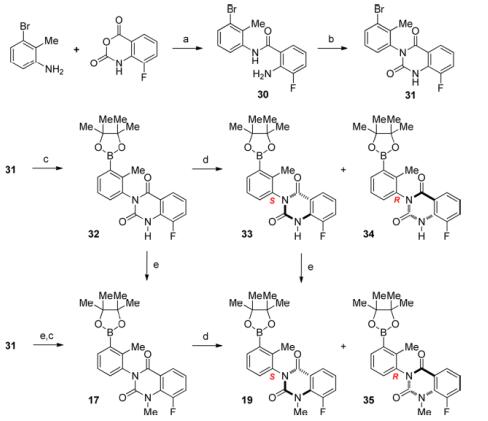
Watterson et al. reported [3] its application on the synthesis of (BMS-986142), which is a reversible inhibitor of bruton’s tyrosine kinase (BTK) conformationally constrained by two locked atropisomers. Bruton's tyrosine kinase (BTK), a nonreceptor tyrosine kinase, is a member of the Tec family of kinases. BTK plays an essential role in B cell receptor (BCR)-mediated signaling as well as Fcγ receptor signaling in monocytes and Fcε receptor signaling in mast cells and basophils, all of which have been implicated in the pathophysiology of autoimmune disease. As a result, inhibition of BTK is anticipated to provide an effective strategy for the clinical treatment of autoimmune diseases such as lupus and rheumatoid arthritis. It was found that two atropisomeric centers were rotationally locked to provide a single, stable atropisomer, resulting in enhanced potency and selectivity as well as a reduction in safety liabilities.
References
1.Kawahata W. et al. Design and synthesis of novel pyrimidine analogs as highly selective, non-covalent BTK inhibitors[J]. Bioorganic & Medicinal Chemistry Letters, 2018, 28:145–151.
2.Skidmore J. et al. Optimization of Sphingosine-1-phosphate‑1 Receptor Agonists: Effects of Acidic, Basic, and Zwitterionic Chemotypes on Pharmacokinetic and Pharmacodynamic Profiles[J]. J. Med. Chem. 2014, 57:10424−10442
Watterson SH. et al. Discovery of 6‑Fluoro-5‑(R)‑(3‑(S)‑(8-fluoro-1-methyl-2,4-dioxo-1,2-dihydroquinazolin-3(4H)‑yl)-2-methylphenyl)-2‑(S)‑(2-hydroxypropan-2-yl)-2,3,4,9-tetrahydro‑1H‑carbazole-8-carboxamide (BMS-986142): A Reversible Inhibitor of Bruton’s Tyrosine Kinase (BTK) Conformationally Constrained by Two Locked Atropisomers[J]. J. Med. Chem. 2016, 59:9173−9200
You may like
Application research of 4,4'-Dibromobiphenyl
Nov 18, 2025
Application research of Octadecyl acrylate
Nov 18, 2025
Lastest Price from 3-Bromo-2-methylaniline manufacturers
3-Bromo-2-methylaniline

US $0.00-0.00/KG2025-04-21
- CAS:
- 55289-36-6
- Min. Order:
- 1KG
- Purity:
- 99%
- Supply Ability:
- 20 mt
3-Bromo-2-methylaniline
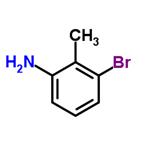
US $122.00-1.00/KG2024-03-25
- CAS:
- 55289-36-6
- Min. Order:
- 1KG
- Purity:
- 99%
- Supply Ability:
- g-kg-tons, free sample is available
